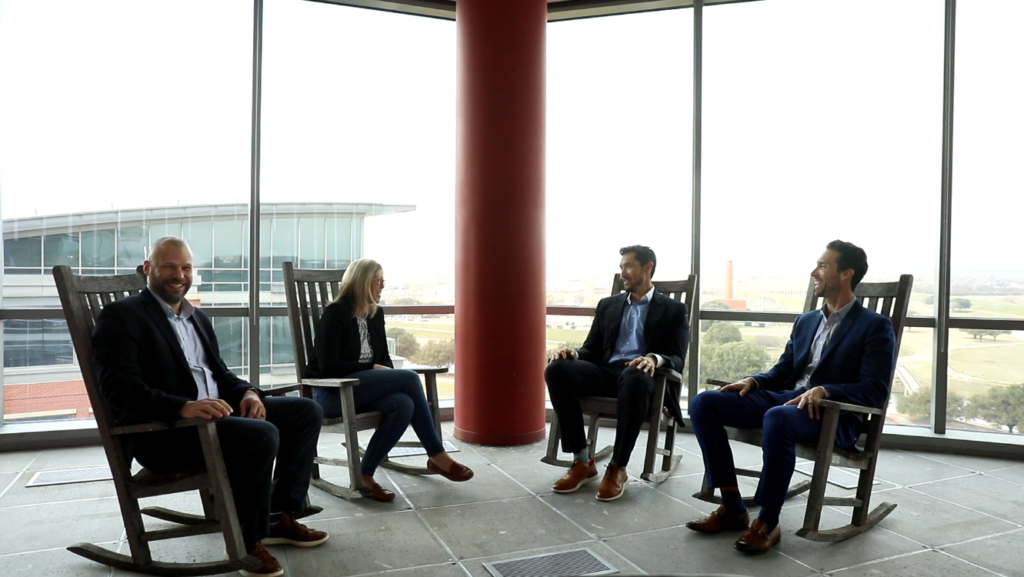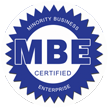
Sundt Construction Spotlight
Best Practices with Cherry Coating
View article at Sundt Construction website
Since 1968, Cherry Coating has provided a wide variety of coating services across Texas. Recently, our Texas Preconstruction Manager Joseph Strub and Sr. Project Manager Holly Horsak sat down with Zack and Rocky Cherry of Cherry Coating to discuss their best practices in selecting which projects to work on. Sundt and Cherry Coating recently worked together on the University of North Texas Biomedical Engineering addition, Arlington’s Beacon Recreation Center, and the Denton County Administrative Complex.
With offices in Dallas, Fort Worth, Austin, Houston, San Antonio, and Nashville, Zack and Rocky are now the third generation of the Cherry family actively managing the company. As the CEO, Zack manages in-house teams and company operations. Rocky, the company’s Vice President, manages estimating, marketing, and business development.

Joseph Strub: What do you guys look for in a relationship as a pursuit in the future?
Rocky Cherry: I think the best thing is the people. The relationship is where it’s at. When we look at a company, we think do they have a national presence. Such as Sundt, we look at things that are common ground, that we communicate well together. Our core values are similar in that things line up and we want to do business with companies like that.
Strub: So I guess on the flip side of it, what makes you decide a relationship is worthwhile?
Zack Cherry: I think many times it’s the people. If we’re working with Holly and don’t get along and don’t see eye to eye in certain areas, you tend to say, “Hey, I don’t think this is a good business relationship and we need to move on.” I think we look at the relationships with the people, not so much the company. We see that if we don’t have that relationship with you [the contractor], it will not be as good because of the trust factor. So, yes, if we don’t see somebody as fair to us because we always want to be fair to them, we’re probably going to step away and not do business with that company.
Strub: We get fixated on the dollars and cents of the businesses and always trying to be competitive. Both of your answers seem like intangibles outside of the cost.
Zack: Absolutely. When you look at it, if you have those relationships and maybe you’re not doing well on a project, or maybe it’s a tough project, we will be fair with each other. And you’re going to try to help us be successful because if we’re not successful, you aren’t successful. So I think that’s where those intangibles come in. You guys trust us, and a lot of times, you go, “hey, you need to finish this area by this time” and we say we are going to do that, it is because of that relationship. We are going to do it, and you know we will. So, I think those intangibles are everything.
Holly Horsak: I think it’s the communication you have on the project, having those hard discussions if need be. But like you said, being able to have those conversations, saying we need a little help here or there, and you recognizing that. For me, we’ve had great communication on all three projects. It’s a very open relationship to be able to have those kinds of discussions.
Rocky: The biggest feedback we’ve gotten back from Brad, our project manager working with Sundt, is to your point; your communication is seamless. We know where we stand, where you all stand, what you need from us, and what we can deliver and what we can’t deliver. We try not to over-promise and to deliver what we know we can. As long as you trust us, those things tend to work out really well.

Strub: How do you find your leads?
Rocky: Once again, it’s based on relationships. We have relationships we’ve built over 50 years. We started in 1968, and we built those relationships with the general contractors. They send us bid invites. We don’t do much direct-to-owner, even though we did that a little bit. We get bid invites through building connections and through our clients, and we pick which projects seem to fit well with our schedule.
Strub: So I always hear you get one hundred [bids] a week. How do you determine which ones are worth spending more time on?
Rocky: Oh, I deal with that every day. There are a lot of them that come in. Basically, we separate our clients into three categories: our legacy key accounts, our new opportunities where those relationships are just developing, and future opportunities. We know that if bid invites come in from our key accounts, we’re going to pay attention to those. Since we’re in the service industry, we try to feed everything that we can from those. When it filters down to those other categories, we become more selective and utilize our resources the best possible way we can.
Horsak: As you’re looking at those certain projects coming in, do you guys have a no-go process internally where you’re all making those decisions of whether or not you’re going actually to pursue that project or not?
Zack: I think it comes down to if it is our key accounts or not. If it’s not a key account and a smaller project, we are probably going to pass. We typically try to do projects over a certain size. If we have the capacity to do it or the estimating team is not busy, we will go ahead and estimate it. Then lastly, really the no-go is when it comes down to that relationship, that if you know a superintendent or a certain project manager that you don’t mesh with, which really doesn’t happen with us very often, then we’re going to pass, or you make it really hard to cover for which makes the job harder on you [the general contractor].
Horsak: How do you guys utilize the feedback you receive from projects you’ve completed or relationships you have had on past projects?
Zack: We try to push our team, whether it’s our project managers or client managers, to reach out to the project team and see what we can do better and did well. The hard part is it depends on when you catch the project manager. If they’re in the middle of a tough time, we all know the stress piles up, and it might be exaggerated. Then again, if you catch them too late and everything’s great, the stress is gone, and they tell you how great everything is. But I know for us, we want that feedback because we want to know what that pain point is. Our whole goal is to service our clients to the best of our ability and deliver what they want from the owner. So I think you’ve got to have that feedback. You’ve got to know what you’re doing right and doing wrong.

Rocky: I think a key indicator of performance is how well you get paid on changes. The reason is that typically the company that services the best you’re more likely to allocate money towards, even if that project’s not doing well. Because why do you want to pay somebody who was combative, who wasn’t helping you out, or wasn’t a team player? Your instincts are not going to be towards helping that person out. But a company that sacrificed as part of the team and was for the greater good? You’re going to want that to take care of that person. Often, we measure our competency and how well we serviced y’all by how we get paid.
Strub: I’ll tell you, the project managers you talked to about loyalty tell you who is great and needs to be used on the next one. It was always that relationship built in the struggle that made them someone they wanted to use again.
Rocky: We typically talk a lot about Navy SEALs. We think they’re one of the greatest structures in the United States of how they operate. We look at them because of the relationships they build in the field or during the action. This is where they develop all their trust in how they bond together. So to your point, in times of strife and times of pain, that’s when you know, when you can really bond with somebody, you know they will be there for you. That’s where you develop that speed of trust and takes your relationship to another level.
Zack: It’s definitely an opportunity. Bad jobs happen a lot, or tough jobs, I should say. We look at it as an opportunity because it’s an opportunity to continue building that relationship and trust.
Strub: So guys, to finish up here, what are some of the key things you guys do that really define your success?
Rocky: I think lately we’ve really pushed marketing. You see how much money companies [like at the Super Bowl] spend on trying to influence their product. Their goal is to make you buy something you don’t really need or want technically, and they make you want it. We’ve tried to really push that presence to help recruit new talent coming in the door and make our business look like something that is sexy and represents our culture. I think it’s a good platform to sell our company and to really sell people on, “Man, I really want to work with this company. It looks fun and exciting. It looks like something I want to be a part of.” Marketing has been a good way to do that using LinkedIn and other social media platforms.
Zack: Yeah, I would say we’ve tried to bring many things in-house–marketing, safety, and anything that we can have a little more control of and people can buy into. I think it helps our company be better because it’s all about our people. The better our people are, the better we’re going to be. So I think those things have really helped us.


